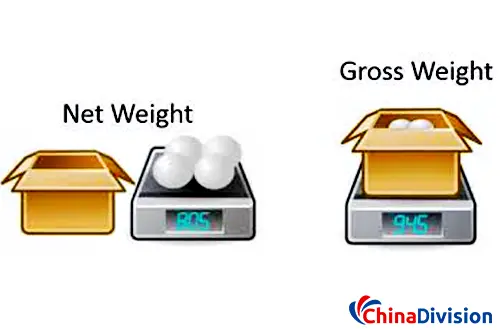The Impact of Gross Weight and Net Weight on Transportation Costs
Since gross weight and net weight are directly related to the cost and efficiency of cargo transportation, freight forwarders will estimate freight based on the weight of the cargo.
What is the gross weight?
Gross weight is the total weight of the goods, including packaging, and is the main basis for freight forwarders to calculate freight. Because different transportation methods have their own weight restrictions.
Different transportation methods (such as sea transportation, air transportation, land transportation) have their own specific weight limits and billing standards. Understanding the gross weight can help ensure that the goods can be transported smoothly and avoid additional costs or transportation delays caused by overweight.
What is net weight?
Net weight is the weight of the goods themselves, excluding packaging. It reflects the actual quality of the goods and is of great significance for calculating the value of goods and tariffs. At the same time, net weight also affects the way goods are stacked and loaded to ensure safety and stability during cargo transportation.
what is the difference between net weight and gross weight?
Gross weight is the total weight of the goods including packaging, while net weight is the weight of the goods without packaging. Calculation formula: gross weight = tare weight + net weight.
in logistics because they affect transportation costs and how goods are handled. Tare weight is the weight of a package or container and must be subtracted from the gross weight to obtain the net weight.

By comparing the gross weight and net weight, you can evaluate the weight proportion of packaging materials, thereby choosing lighter and more environmentally friendly packaging materials to reduce transportation costs. At the same time, according to the weight and volume of the goods, a reasonable loading plan can be formulated to improve transportation efficiency.
What impact do gross weight and net weight have on transportation costs?
freight
Shipping charges are usually based on the weight of the goods being shipped. Carriers may have different rate structures based on weight category. Generally speaking, heavier hauls incur higher costs due to increased fuel consumption and vehicle wear and tear.
Although net weight does not directly determine shipping costs, it reflects the actual quality of the goods and helps to calculate duties and other charges more accurately. If the weight of packaging materials is relatively large, the gross weight will be relatively high, thus increasing transportation costs.
Shipping costs can be reduced by choosing lighter packaging materials or more rational loading methods.
Space utilization
Carriers may charge based on weight or volume (whichever is greater). Larger, lighter cargo may take up more space in a vehicle or container, affecting costs.
Loading and unloading costs
Heavier cargo may require special handling equipment or additional labor to load and unload. This can increase handling costs, especially if the cargo is bulky or difficult to maneuver.
fuel cost
Heavier cargo requires more fuel to transport, especially over long distances. Fluctuations in fuel prices can significantly impact transportation costs, making heavier shipments more expensive during periods of high fuel prices.
insurance fee
Insurance premiums for shipping goods may be affected by the weight of the goods. Heavier cargo may carry a higher risk of accident or damage, resulting in higher insurance premiums.
Transportation method
Air freight is generally more weight-sensitive, while sea freight may be more susceptible to volume due to container space constraints.
Both gross and net weight play a vital role in determining shipping costs, the net weight of the goods determines its actual weight, while the gross weight determines the shipping cost.
Also important is dimensional weight, which is calculated based on the space occupied by the cargo. Packaging materials and methods also affect shipping costs. So these factors need to be carefully considered when planning logistics operations to optimize costs and efficiency.
So how to calculate freight billing weight?
Dimensional weight is the space a package takes up based on its dimensions, then converted to its equivalent weight. Calculation formula: volumetric weight = (length x width x height) / conversion factor
The freight billing weight is the larger of gross weight and volumetric weight. The exact calculation depends on the actual size and weight of the shipment. Dimensional weight is calculated based on package dimensions, especially when the dimensional weight is greater than the actual weight.
If the dimensional weight is greater than the gross weight, it is considered the billable weight. Additionally, shipping costs will also increase if your package uses heavy packaging materials such as foam, boxes, etc. as this will increase the total weight.
In actual operation, correctly calculating and understanding the difference between gross weight and net weight can help us estimate transportation costs more accurately and formulate a more reasonable transportation plan.
At the same time, choosing appropriate packaging materials and loading methods can also effectively reduce transportation costs and improve transportation efficiency. Accurate weight data helps companies optimize packaging to achieve the best balance of cost effectiveness and shipping efficiency.
If you encounter any questions or need help during the transportation of goods, you may wish to contact us - chinadivision. We have rich cargo transportation experience and a professional team, able to provide you with a full range of transportation services and solutions. Whether you need to know the specific calculation method of gross weight and net weight, or you want to optimize transportation costs and improve transportation efficiency, we can provide you with professional guidance and help.





